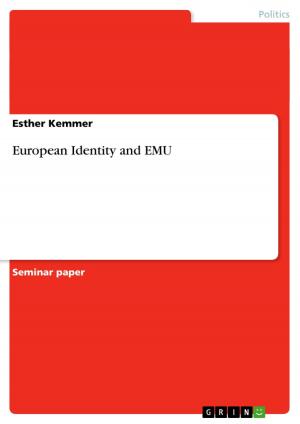The Falklands Crisis: Britain's Justifications for its Resort to Military Force through the Example of a Speech by Margaret Thatcher
Nonfiction, Reference & Language, Study Aids, ESL, Foreign Languages| Author: | Nadine Theiler | ISBN: | 9783638567770 |
| Publisher: | GRIN Publishing | Publication: | November 10, 2006 |
| Imprint: | GRIN Publishing | Language: | English |
| Author: | Nadine Theiler |
| ISBN: | 9783638567770 |
| Publisher: | GRIN Publishing |
| Publication: | November 10, 2006 |
| Imprint: | GRIN Publishing |
| Language: | English |
Seminar paper from the year 2006 in the subject English Language and Literature Studies - Culture and Applied Geography, grade: 1, , 11 entries in the bibliography, language: English, abstract: 'Most wars throughout history have not been contests between right and wrong, but clashes 'between one half-right that was too wilful and another half-right that was too proud.'' Despite the truth this interpretation holds, for the respective belligerents of course it will not be acceptable, as to every nation the cause it went to war over will be the morally right one - and if it is not, it will at least be presented as such in public. The speech, laid down as the basis of this paper, is a good example of this kind of governmental conduct, with Thatcher defending Britain's actions as righteous and even imperative. This paper seeks to examine the Prime minister's reasoning and to apply a balanced analysis to it. It does so in three respects: first, by critically looking at the question of sovereignty over the islands, which is the basic conflict underlying the struggle, and by evaluating the aspect of law enforcement, which Britain brought forward as the cause for the war; second, through an exploration of Thatcher's attempt to refute objections to the war, which is closely linked to the criteria of Just War theory2; and third, by reflecting on two factors, commonly viewed as contributory to the British decision to go war, but - and with good reason - not mentioned in Thatcher's speech. A conclusion will then be presented, briefly assessing the findings of the preceding chapters. To provide a context for this analysis, however, I will first of all review the conflict's antecedents and consequences, focusing on the build-up to the war rather than on the course of it, then summarise the content of Thatcher's speech.
Seminar paper from the year 2006 in the subject English Language and Literature Studies - Culture and Applied Geography, grade: 1, , 11 entries in the bibliography, language: English, abstract: 'Most wars throughout history have not been contests between right and wrong, but clashes 'between one half-right that was too wilful and another half-right that was too proud.'' Despite the truth this interpretation holds, for the respective belligerents of course it will not be acceptable, as to every nation the cause it went to war over will be the morally right one - and if it is not, it will at least be presented as such in public. The speech, laid down as the basis of this paper, is a good example of this kind of governmental conduct, with Thatcher defending Britain's actions as righteous and even imperative. This paper seeks to examine the Prime minister's reasoning and to apply a balanced analysis to it. It does so in three respects: first, by critically looking at the question of sovereignty over the islands, which is the basic conflict underlying the struggle, and by evaluating the aspect of law enforcement, which Britain brought forward as the cause for the war; second, through an exploration of Thatcher's attempt to refute objections to the war, which is closely linked to the criteria of Just War theory2; and third, by reflecting on two factors, commonly viewed as contributory to the British decision to go war, but - and with good reason - not mentioned in Thatcher's speech. A conclusion will then be presented, briefly assessing the findings of the preceding chapters. To provide a context for this analysis, however, I will first of all review the conflict's antecedents and consequences, focusing on the build-up to the war rather than on the course of it, then summarise the content of Thatcher's speech.















